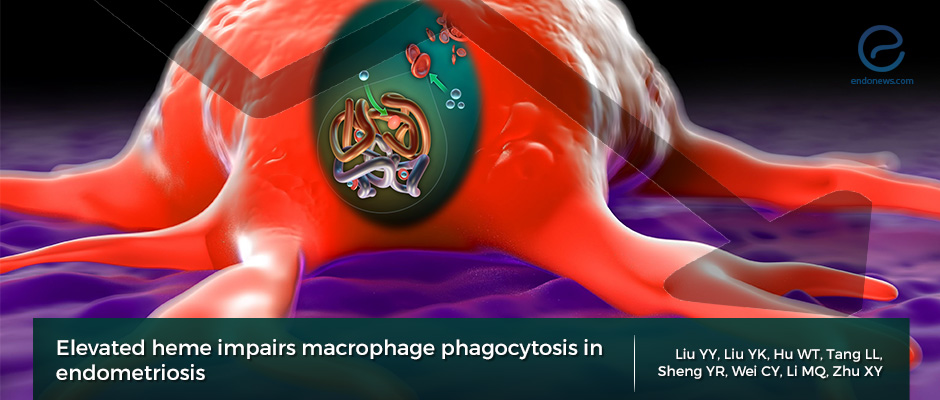Heme impairs macrophage phagocytosis
Jul 31, 2019
Macrophage does not eat red meat
Key Points
Highlight:
- High heme (iron-containing molecule that carries oxygen in the body) negatively affect macrophage phagocytic function in endometriosis.
Importance:
- It is believed that endometriosis is caused by defective peritoneal macrophages, which fail to eliminate ectopic endometrial tissues.
- However, it is not known how these macrophages become malfunction in the first place.
What's done here:
- This study determines peritoneal heme concentration in women with endometriosis.
- Endometriotic tissues and endometriotic peritoneal fluid were collected from women with ovarian endometriosis (n=45).
- Control endometrial tissues (n=35) were collected from premenopausal women with no abnormal gynecologic condition.
- Control peritoneal fluid (n=45) was collected from patients with uterine fibroid, mature teratoma or ovarian simple cyst.
- Macrophage phagocytosis efficiency was measured.
Data:
- Heme concentration was increased in patients with endometriosis, as compared to control.
- Peritoneal macrophages showed reduced phagocytic ability in the endometriosis group.
Limitation:
- Although heme reduces the phagocytic ability of peritoneal macrophage, the exact molecular level understanding behind it is lacking.
- This is a medium-size study with around 35-45 women. The study conclusion will be better supported by a larger number of participant.
Lay Summary
Heme is an iron-containing molecule that carries oxygen in the blood and also serves many essential biological proteins. It is released from ruptured erythrocytes during hemolysis. If not chelated, heme can cause harmful oxidative damage and inflammation. Thus, heme is usually bound to its scavenger hemopexin, to prevent the harmful effect. When taken up by a cell, heme is degraded by heme oxygenase-1 (HO). However, the capacity to scavenge heme may saturate in pathologic conditions, leading to tissue damage.
Women with endometriosis showed higher volumes of reflux menstrual blood. In addition, in developing endometriosis, the bleeding from the endometrial lesion may further increase the number of erythrocytes. Hence, heme, which is a by-product of lysed erythrocytes, may accumulate in the peritoneal cavity of women with endometriosis, causing an oxidative and immunoregulatory effect.
In the current study, Liu et al. from Shanghai Key Laboratory of Female Reproductive Endocrine-Related Diseases, Shanghai, China investigated whether there is abnormal heme accumulation in the pelvic cavity of women with EMS and assessed the association between heme and macrophage.
The results, published in Reproduction, showed that women with endometriosis had significantly higher heme levels in the peritoneal fluid compared with the control. The peritoneal macrophages from women with endometriosis had a lower phagocytic ability. At the same time, ex vivo study found that a high concentration of heme actually impaired endometriosis peritoneal macrophage phagocytic activity.
Previously many studies have shown that heme serves a pathogenic role in endometriosis because it can trigger reactive oxygen species production. However, there has been a lack of study assessing whether heme has any direct effect on the immunological setting. This study is important and reveals that an excess of heme in endometriosis causes impaired phagocytosis of the peritoneal macrophages. Reduced macrophage phagocytic activity would result in an accumulation of ectopic endometrial tissue which ultimately contributes to endometriosis pathogenesis.
Research Source: https://www.ncbi.nlm.nih.gov/pubmed/31299634
immune system reactive oxygen species

